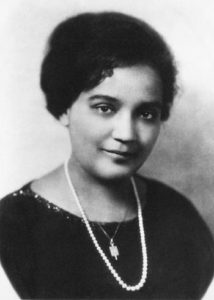
Jessie Fauset
*On this date, Jessie Redmon Fauset was born in 1882. She was a Black novelist, critic, poet, and editor.
Fauset graduated from Cornell University in Ithaca, N.Y. (B.A., 1905). She later earned a master's from the University of Pennsylvania (1919). For several years, she taught French at an all-Black secondary school in Washington, D.C.. While there, she published articles in The Crisis magazine and the journal of the National Association for the Advancement of Colored People (NAACP). Its editor, W.E.B. Du Bois, persuaded her to move to New York City to become the magazine's literary editor.
From 1919 to 1926, she published the works of such writers as Langston Hughes, Countee Cullen, Claude McKay, and Jean Toomer. She also edited and wrote for The Brownies' Book, a short-lived periodical for Black children. In her work, Fauset portrayed mostly middle-class Black characters forced to deal with self-hate and racial prejudice. Some critics felt her portrayals were overly idealistic, while others noted their subtle use of underlying frustration.
In Fauset's best-known novel, Comedy: American Style (1933), Olivia Carey, the protagonist, is a Black woman who longs to be white, while her son and husband take pride in their cultural heritage. Fauset's other novels include There Is Confusion (1924), Plum Bun (1928), and The Chinaberry Tree (1931). Jessie Redmon Fauset, known for discovering and encouraging several writers of the Harlem Renaissance, died on April 30, 1961, in Philadelphia, PA.
Black Women in America An Historical Encyclopedia
Volumes 1 and 2, edited by Darlene Clark Hine
Copyright 1993, Carlson Publishing Inc., Brooklyn, New York
ISBN 0-926019-61-9